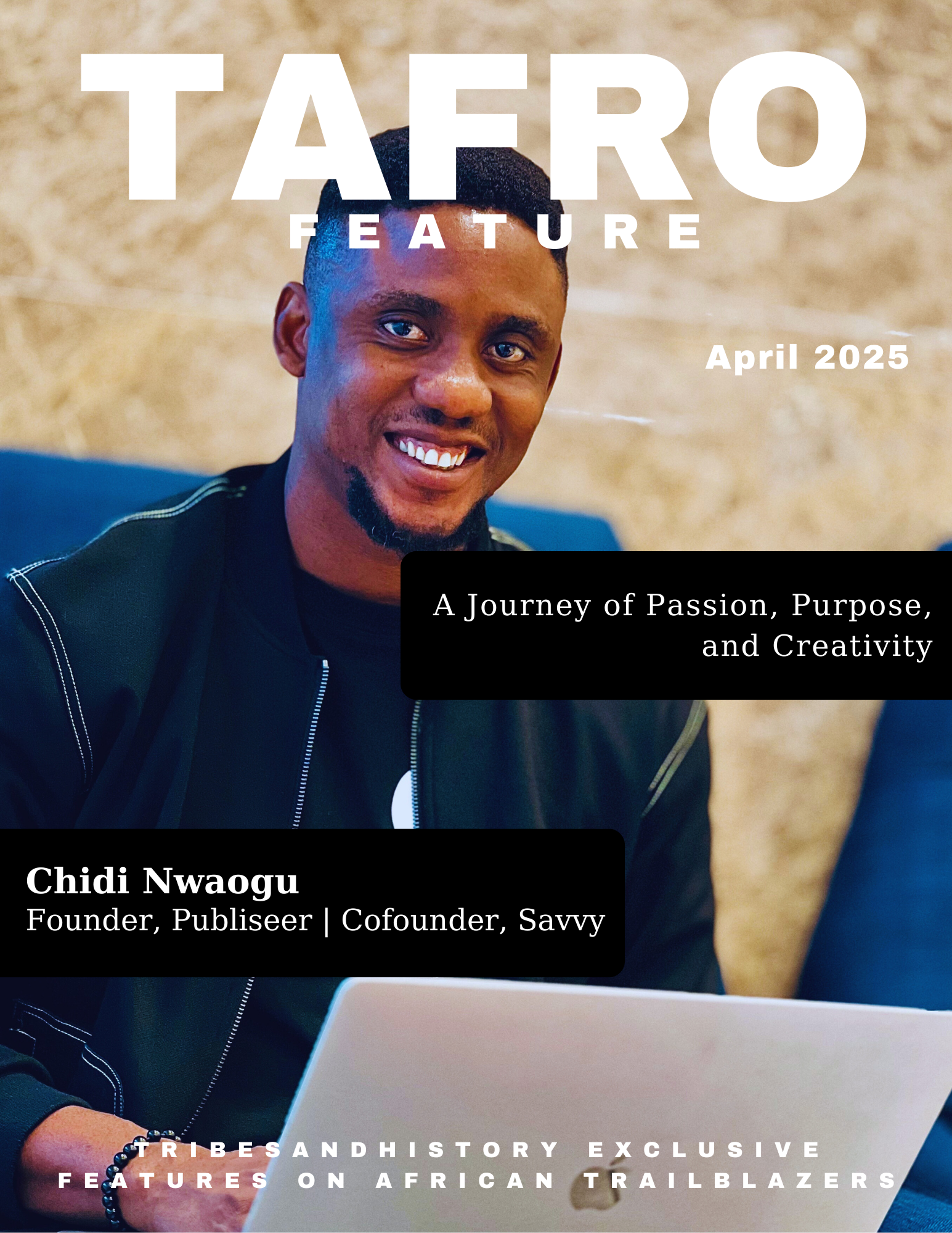
TribesAndHistory: What is your name, and how would you like to be addressed?
Chidi: My name is Chidi.
TribesAndHistory: How can readers connect with you?
Chidi: Oh, well, I’m on almost every social media platform—except TikTok. You can find me on Facebook and Twitter. I also have a website: nwaogu.com.
TribesAndHistory: Where are you from?
Chidi: I’m from Nigeria. My English name is Dominic, but I don’t use it because I believe my Igbo name, Chidi, already tells people where I’m from. I was born and raised in Nigeria, though I’ve traveled to many countries and lived in different places. But Nigeria is home—it’s where I’ve had most of my experiences.
My work in tech often has me moving around for fellowship programs, speaking engagements, and networking opportunities. At one point, I wasn’t in the same place for more than two months at a time. All that travel shaped my understanding of life—I met so many people, experienced different cultures, and saw firsthand how vast the world is. That exposure gave me a deep sense of gratitude and perspective. You realize that billions of people have their own stories and struggles, and it humbles you.
TribesAndHistory: What do you do?
Chidi: I’m a software engineer and tech entrepreneur. I started as a self-taught developer, but in the early days, coding made me somewhat of a chronic introvert. I was always in front of a computer. Then, I got advice from someone I really admired—he told me I needed to step out of my shell and embrace the world. That changed everything for me.
I realized that if I only stayed behind the screen as a software engineer, I wouldn’t be fully engaged with the world. So, I decided to become a tech entrepreneur. I didn’t just want to build products; I wanted to sell them, market them, and be the face of them. That led me to co-found several startups. My first was a social network for students at my university, the University of Lagos, where I studied physics. My twin brother and I built it, and it gained a million users before being acquired. That was my first taste of building and exiting a company, and I knew it was something I wanted to do long-term—identify problems, build tech solutions, scale them, and grow businesses.
TribesAndHistory: Are both you and your twin brother software engineers, or do you have different roles?
Chidi: We’re both software engineers and tech entrepreneurs. I often say we’re the same person in different skins. The only difference is our temperament, but otherwise, we’re identical in every way—same skills, same passion.
TribesAndHistory: How many companies or projects have you built so far?
Chidi: That’s a tricky question because some succeeded, and some failed. Let me try to break it down:
Overall, I’d say we’ve built about five or six startups, with a mix of successes and failures.
TribesAndHistory: What inspired you to pursue this career?
Chidi: It started when I was about seven. My mom lost her job, and things became really tough for us. That moment shaped my mindset—I didn’t want to be in a position where someone else could decide my financial stability. I wanted to build something of my own so I could control my future. I never set out to learn coding just to work for big companies like Google or Microsoft. I learned it so I could create my own businesses, solve problems, and have control over my career path.

TribesAndHistory: Can you tell us more about Publiseer?
Chidi: Publiseer started on August 4, 2017. My brother and I had personal experiences that led us to create it—I was a writer publishing fiction novels, and my brother was a musician. We thought all you needed was talent, and the rest would fall into place. But we quickly realized that the creative business is just as important as the creative process itself.
There were so many obstacles in the industry, especially for African creatives. We lost money trying to build our careers, and we saw other creatives facing similar struggles. So we decided to build a platform to solve these problems—specifically for African creatives.
At first, we thought it was a local issue, but as we grew, we realized it was a global problem. Today, Publiseer has served over 12,000 creators across eight African countries. In 2021, the Alibaba Foundation recognized us as one of the top 10 African businesses.
It hasn’t been all smooth sailing—there have been challenges and steep learning curves—but it’s the company we’ve learned the most from, and it’s also been our most profitable venture.
TribesAndHistory: Can you share a pivotal moment in your career that shaped the leader you are today?
Chidi: That would be in 2018, about a year after we founded Publiseer. We were struggling—spending a lot of money, but revenue wasn’t coming in as expected. It was frustrating because we knew we were solving a real problem, yet the business wasn’t taking off the way we had hoped.
We considered shutting it down, but instead, we took a step back to analyze what we were doing wrong. That’s when we realized we were trying to be another content aggregator, just focusing on payment issues. But we weren’t a fintech company—we were a digital media company. Once we embraced our true identity and refocused, things started to change.
That moment taught me the importance of adaptability and staying true to the core mission. It was a tough lesson, but it shaped the way I approach business today. It also taught me that you don’t have to focus on money. Rather focus on solving a problem, and money will follow.
TribesAndHistory: What about your heritage makes you proud
Chidi: My heritage is Igbo, and I often tell people that I have this inbuilt DNA to build, create, and transform. Igbos have an extraordinary ability to adapt and thrive. We can go to a new country, knowing no one, and still build something remarkable. It’s as if you place an Igbo person in the middle of a desert, leave for five years, and return to find an entire community flourishing.
I believe this is rooted in our abundance mentality—the belief that we are self-sufficient, that we can go anywhere and make magic happen. This mindset has guided me throughout my life. I was raised in an environment where I saw people achieve incredible things despite humble beginnings. They set their minds on something and made it happen.
A friend once told me he admires that when I set a goal, I not only achieve it but often exceed it. If I say, “I will accomplish this by a certain time,” you can check in with me later, and I will have done it—and possibly even more.
Let me share a story that illustrates this. Some time ago, the United Nations selected ten startups to receive funding. Many Nigerian startups applied, but mine was the only one chosen. When I asked why, I was told that Nigerian startups often don’t follow through on their commitments. I saw this as a challenge—to change that narrative.
When we received the funding, I ensured that every dollar was used as promised and went beyond the expected results. When it came time to submit a report, we were the only startup out of the ten that not only met but exceeded our targets. This was my way of proving that Nigerian entrepreneurs can be reliable, accountable, and innovative.
At the core of my work is a mission to shift the perception of Africa. Yes, Africa has its challenges—corruption, violence, and systemic issues—but so does every other part of the world. The difference is in how the story is told. I want to rewrite that story.
Africa is more than just negative statistics. We have brilliant minds, pioneers, and innovators—whether on the continent or abroad—pushing boundaries and redefining excellence. In nearly every major country, you’ll find Africans among the top percentage of achievers, striving for better and making a difference. That is the story I want to tell.
We noticed you're visiting from Spain. We've updated our prices to Euro for your shopping convenience. Use United States (US) dollar instead. Dismiss